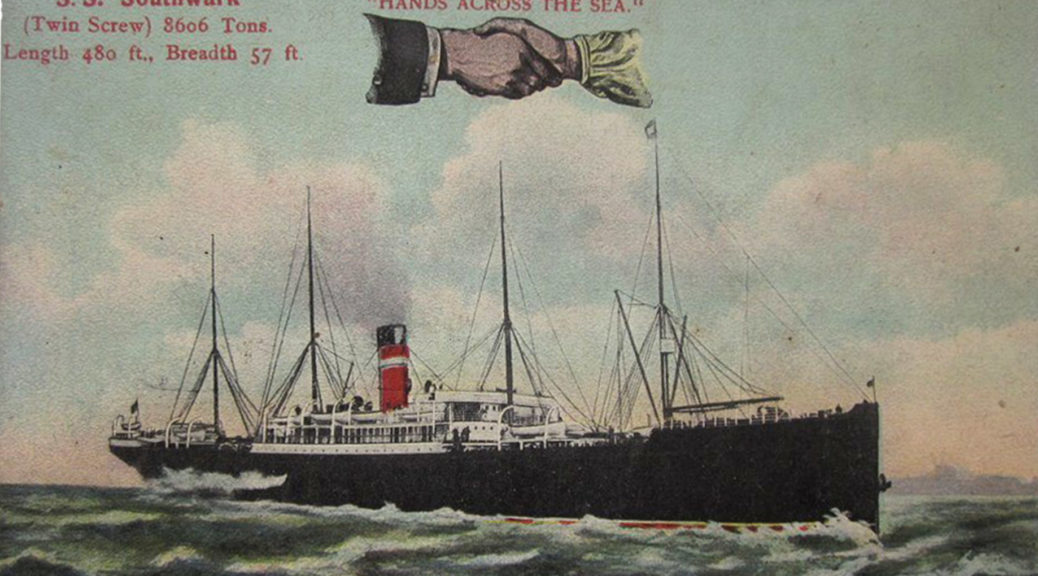
Somewhere in the early 1900s, Upstanding Edwin’s oldest son – John Walden Poulson, the Wastrel – transitioned from promising oldest son of a local family to an intractable problem that defied family attempts to help him.
John Walden was captain of the Knottingley cricket team – younger brother Thomas played too. When Thomas married Lily Taylor in September 1901, the newspaper write up talked of the crowds outside the Wesleyan chapel. John Walden was there with his new wife Emily, and daughters Emily, 11, and Nellie, 10, were bridesmaids. But by the time his youngest brother Charles married in 1909, John Walden had vanished, although Doris (Aunty Goggie), 13, was a bridesmaid and Ernest (I think Gamps, who was John Ernest Llewellyn), 12, was a page. Something had changed…
Newspaper accounts of John Walden’s young adult life in Knottingley and Ferrybridge show he not only played cricket, but was also treasurer of the Osgoldcross Cricket Club; he was elected to the Ferry Fryston school board in 1902; was manager of his father’s pottery business in Ferrybridge; was involved in the Wesleyan Methodist Church – for example, presiding over a new Church opening in Purston in 1904. He had a good job, great prospects (to inherit his father’s business), a home and a growing family – he became a father for the sixth time in 1905 (Ethel Suzanne was his last child – I think). His father had made all of this possible, but the benefits were John Walden’s if he could just not mess it up.
There isn’t a lot of information about John Walden in the years leading up to 1910, but in 1906 he failed in a bid for a seat on the Knottingley Urban District Council (a position his father had held in the past). In 1908, John Walden sold a home and land he owned in Knottingley – Hopewell House – with “barn, orchard, stables, etc.” to Joseph Horn of Ferrybridge for £820. That’s just shy of £100,000 today.
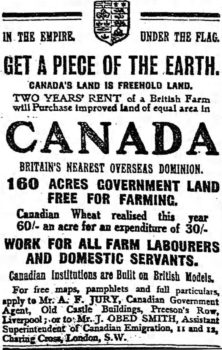
I can imagine a variety of possibilities that explain his decision to get on a boat to Canada in the summer of 1910, ostensibly to become a farmer in Ripley, Ontario. I have to assume the 1908 property sale was related. However, so far I don’t know why, only who, what and when (with a little bit of where).
In April 1910, John Walden sold another parcel of land in Knottingley and the sale record describes John Walden as “of Emsworth” which is where his sister Mary Ellen (Mrs. Theophilus Wood) lived in Portsmouth, Hampshire with her solicitor husband and son Edwin Llewellyn (3 years older than my grandfather).
It seems likely these property sales were in preparation for leaving, but other than a recollection my grandfather passed on to my mother that he had to look after the girls (I assume his two younger sisters) when his father wasn’t around, I have a lot of missing details about the family splintering in 1910.
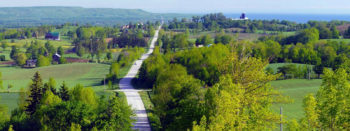
On May 28th 1910, the SS Southwark set sail for Quebec and docked June 7th, starting John Walden on his path to becoming a farmer – something I believe he knew nothing about. From an article in the Sheffield Telegraph in 1907, “When they get to Toronto, nine hours by rail from where they land at Montreal, they go to the Bureau of Colonisation, and from there are distributed to suitable billets free of cost to themselves, no matter how far away … the farm may be that requires their services.”
When digging through family history, I found one other person who had left England (and a wife and child) to go to Canada – an accountant, so probably just as unlikely a farming settler as John Walden. Curiosity grew – was it was two lunatic relatives or something more general going on? What’s with Canada?
Some searches in the newspaper archives helped explain the context; there was a huge wave of migration from the UK to Canada, Australia and New Zealand (the “Britain of the South” in one ad) in the first decade or so of the 20th century. These relatives were doing something questionable, but it was part of a trend, one that made lots of sense for millions of people.
There were many ads and newspaper articles in England peddling fantastical narratives about the opportunities for settlers willing to move to one of the three parts of the empire in need of labor. From the Fraserburgh Herald in November 1909: “The success of even the humblest settler is thus never in doubt provided he possesses energy, perseverance and adaptability.” And here is a 1908 ad in The Times pitching the appeal of becoming an Ontario farmer
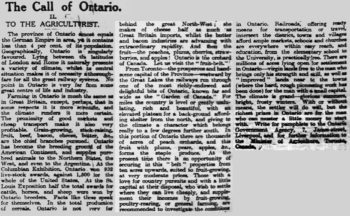
At the end of 1905, an article in The Bradford Telegraph reported the Canadian government “…have decided to meet the proposed Australian emigration propaganda in Great Britain…by additional activity and increased staff.” They point to the success of the half million migrants to Canada in recent years as justification for inducing “…the toiling millions of Europe to settle in Canada, and partake of the unexampled prosperity existing there.” I love the notion they see Australia’s ads as propaganda, but theirs as justified.
The Guardian noted in August 1910 that the immigrants into Canada in the first six months of the year was around 160,000, of which 75,000 were from the UK and the rest Americans settling in Western Canada. John Walden was joining a land rush. I can completely understand the appeal of free or low cost land for many people in England who would have had very little chance of that sort of ownership at home, especially if they knew something about how to farm.
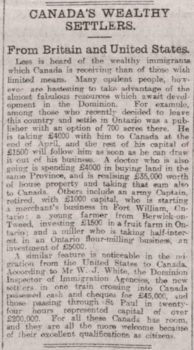 What is a real puzzle is what John Walden thought he was doing. Unless he’d already been in legal trouble – I’ll be covering his later legal troubles in England after he returns from Canada – and he was running away from them, he had all sorts of prospects ahead of him if he stayed in Yorkshire. Yorkshire is where his wife and six children were. Possibly he was dreaming of becoming really wealthy – articles like this one in the Dundee Telegraph (April 1910, so too late to have influenced him specifically), suggesting that all the cool rich people are going to Canada, might have seemed enticing to someone not really thinking clearly. Today, we’d call that FOMO – fear of missing out. FYI £1,000 in 1910 is about £115,000 today.
What is a real puzzle is what John Walden thought he was doing. Unless he’d already been in legal trouble – I’ll be covering his later legal troubles in England after he returns from Canada – and he was running away from them, he had all sorts of prospects ahead of him if he stayed in Yorkshire. Yorkshire is where his wife and six children were. Possibly he was dreaming of becoming really wealthy – articles like this one in the Dundee Telegraph (April 1910, so too late to have influenced him specifically), suggesting that all the cool rich people are going to Canada, might have seemed enticing to someone not really thinking clearly. Today, we’d call that FOMO – fear of missing out. FYI £1,000 in 1910 is about £115,000 today.
John Walden returned from Canada in 1916 on the SS Northland, landing in Liverpool on December 1st. I don’t know how his 6 years in Canada went – I couldn’t find him on the Canadian census in 1911. The good news I didn’t find his name in the newspapers for anything awful either!
John Walden’s wife Emily was still alive when he docked, but I think it’d be wishful thinking to assume he returned because he wanted to see her before she died – I’ve found no indication they saw one another again. A newspaper article about him once he was in trouble with the law mentioned he returned “…with the Canadian troops. On leaving the Army he took up managership of a Goole hotel…” I can find no military record for him in World War I, and at 46 he wasn’t a likely draftee. It’s possible he just said he’d been in the Army to improve people’s impressions of him.
There were many articles in the Canadian papers encouraging young men to enlist to fight in the war, but I’d guess farming wasn’t working out so well (or perhaps was just really hard work that he didn’t like) and he came home when the money ran out. But what was he coming back to? His father, Edwin, was still alive and running the pottery, but Charles, the youngest son, was the one groomed to take over the business (and I don’t know why Thomas, the second oldest son, didn’t take over – perhaps he just wasn’t well suited).
John Walden’s oldest daughter, Emily Muriel had started teaching at the Chelmsford County High School for Girls in 1915. Nellie Gwendoline – Gwen – was (as of early 1914) Mrs. John Kille and living in Portsmouth. On December 27 1914, John Walden became a grandfather for the first time when Gwen & Jack had a daughter, Joan.
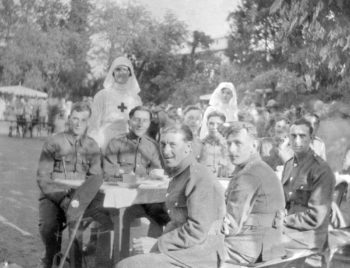
My grandfather turned 17 in June 1914 and enlisted August 4th, saying he’d been born in 1896 so they’d take him. On October 9 he was on his way to India – gone by the time his father returned. His sister Goggie (Doris) qualified as a registered nurse, according to the 1926 Register of Nurses, from 1913-15 at Chiswick Hospital, London, so she too had started an independent life. (In the picture of recovering soldiers in an Indian hospital, Gamps is seated on the far right. He had been bitten by a scorpion, not wounded directly by his service in the Royal Field Artillery!)
The two youngest daughters, Millicent and Ethel were 14 and 11 when their father returned, but I’m assuming they were still with their grandfather, John Henry Shepherd in Ferrybridge. I know that Millicent was in Ferrybridge in June 1917, as she was the person with her mother, Emily, when she died – her name is the one “in attendance” who reported the death to the registrar. It may be that John Walden wasn’t welcome in John Henry Shepherd’s home – there were certainly enough reasons to tell him to leave them all alone.
And that was before John Walden’s name got into the papers once more after he abused his father’s trust, traded on Edwin’s good name and got himself tossed in jail…

